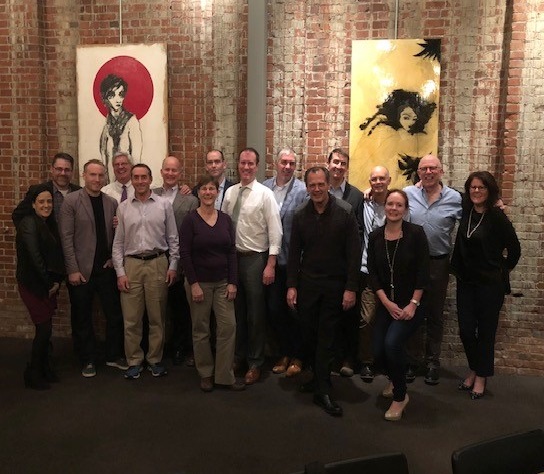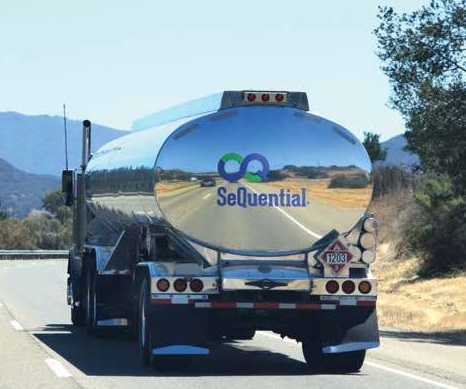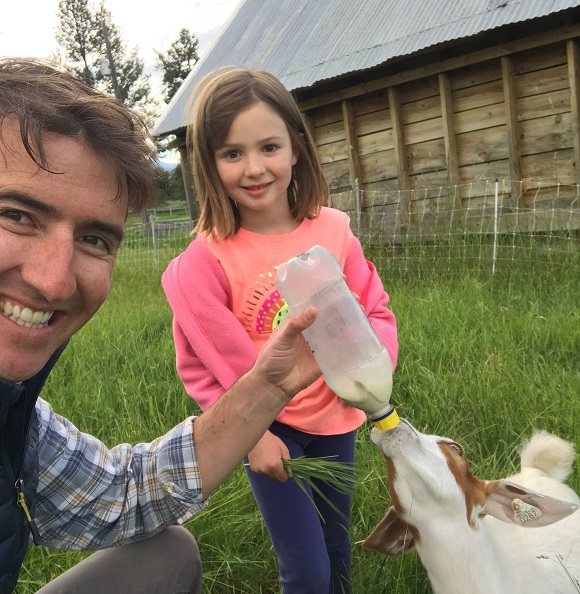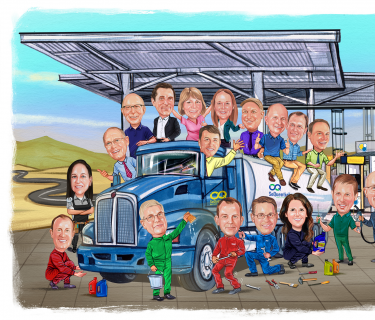Entrepreneur Owner-Manager Background
The long journey to successfully building a business from scratch always has a few seminal waypoints. For Tyson Keever, one of those was an unexpected meeting with the founder of the fastest growing potato chip manufacturer in the country. The founder, Cameron Healy, had started Kettle Chips, a rapidly growing, highly-acclaimed manufacturer of kettle/flavored potato chips that, in 2005, was taking the snack food industry by storm. Healy had gone to see Keever and his two partners because Kettle was generating a lot of used cooking oil from its potato chip production process, but had no strategy for its disposal or (eureka!) even reuse.
But the path leading to that fateful meeting began much further back, to Tyson’s formative years. Keever was born and raised in Oregon, and always had a penchant for the outdoors—hiking, camping, skiing, sailing—whatever got him into fresh air. He attended “U of O” (University of Oregon) and it was there that he began to fuel his passions for environmental stewardship and business entrepreneurship. Shortly after graduating, Tyson and a college friend came up with the idea of an eco-friendly gasoline station—selling biodiesel and other lower carbon energy products outside, and natural foods inside the convenience store.
Tyson’s real passion was for finding ways to recycle waste by-product and convert them into eco-friendly, utilitarian end products. In Tyson’s mind, if one could build a system for capturing all the used cooking oil or “UCO” generated from wholesale food production and food service establishments, and then build production capacity to reconstitute that UCO into finished biodiesel, you’d have a “win-win” business. Those “lights went on” after that fateful first meeting, with Keever and his partners joining Healy to form Sequential-Pacific Biodiesel (https://choosesq.com/). Over the course of the next 14 years, Cameron and Tyson would entice other investors to join and fund the growth of Sequential, including such notable environmentalists/entertainers as Willie Nelson and Jack Johnson.
By 2017, SeQuential-Pacific Biodiesel had grown to become the largest integrated collector of UCO and producer of biodiesel in the Pacific Northwest, with 9 million gallons of biodiesel production capacity and a last-mile UCO collection service business that stretched from Washington State to Southern California.
Bigelow Relationship
Bigelow first met Tyson, Cameron, and the SeQuential Board in July of 2016. The Board was wrestling with the usual tactical issues that come with governing a fast growing, capital intensive business. How can we integrate the “mom & pop” collection business acquisitions we made using best operating practices to optimize their financial performance? What should be our corporate marketing strategy for growing the collection side of the business as well as building markets for our finished biodiesel products? How can we upgrade financial reporting to measure the business? What are the opportunities to grow biodiesel production in the Salem facility? How can we attract the next level of management talent to help Tyson with day-to-day execution and longer-term planning?
Bigelow offered its objective view on the industry landscape and probed on certain key themes. What did the Shareholders want to achieve with their investments, and what were their individual time-horizons? How did the Board perceive the exogenous risks of the business, given the heavily regulated nature of the company’s markets and commodity, price-driven products? Could SeQuential scale the business to move from being a regional to a national player? How would the eventual Enterprise Value of a business like SeQuential, with such a significant portion of their profit coming from government incentive tax credits, be viewed by potential acquirers? What were Tyson’s personal and professional goals?
From these early discussions, a roadmap was co-developed which identified a handful of key initiatives to significantly improve the operating strategy and financial performance of the business, paving the way for a future capital gain event.
“The transaction was its own journey. You guys spent an enourmous amount of time getting to know us and clearly it’s part of your culture to do that. And that was extremely impressive to see. It was clear that you do things differently.” Cameron Healy, Founder & Former Owner of Kettle Chips Inc. and Board Member & Principal Investor SeQuential-Pacific Biodiesel, LLC



“Bigelow, your leadership along the journey of this transaction is what got us here. Thank you!” Tyson Keever, President & CEO SeQuential-Pacific Biodiesel, LLC
Challenges
At the time Bigelow first met with Tyson and the SeQuential Board, the tax credit-driven incentive system for biodiesel production put in place by the Federal government had become increasingly volatile. Would the incentives be kept in place? Would the policymakers continue to make this an annual decision by including the related legislation as part of the year-end “extenders tax package”? This legislative behavior drove price instability and margin uncertainty throughout the industry. Bigelow cautioned the Board that these industry dynamics would likely take any institutional equity investor, like private equity, out of the running to eventually acquire SeQuential. They needed to focus on strategic investors who would see compelling value in SeQuential’s unique strategy and attractive geographic market.
Additionally, the increasing capital requirements of the business (new trucks, new UCO scanning equipment, added plant capacity, additional “tuck-in” acquisitions) served to catalyze frank discussion among the Board and Cameron, the Primary Funding Shareholder on what financial support they could count on. At 69, and now exited from his very successful entrepreneurial journey with Kettle Foods, Cameron was interested in dedicating all of his remaining time, talent, and treasure to doing good work through his family’s 501c3, The Healy Foundation. It was clear that the timing was propitious for SeQuential to seek a new majority owner to take the business to the next level.
Outcome
Bigelow strongly recommended to the Board that a wide net be cast to consider all forms of potential strategic investors—those operating within SeQuential’s immediate supply chain, and those in adjacencies i.e. would an environmental services company see value in being in SeQuential’s business? Bigelow also helped prepare Management for the eventual forensic effort that investors would conduct to understand the drivers of profit within the different aspects of the company’s integrated model—where was the company making its profit? This included hiring a leading regional accounting firm, Moss Adams LLP, to complete a comprehensive Quality of Earnings report to educate prospective acquirers.
After considering a handful of qualified expressions of interest, the Board, led by Chairman Dave Garten and Tyson, felt the most compelling fit was offered by combining forces with the largest biodiesel producer in the State of California, Crimson Renewable Energy, L.P. (http://www.crimsonrenewable.com/). Crimson was well known to SeQuential through an existing supply contract where SeQuential provided UCO collected in Southern California to Crimson’s production facility in Bakersfield, CA. In Dave Garten’s own words, “I really appreciated Bigelow’s diligent understanding of the business that allowed them to convey and showcase it to investors in ways that we never could have. It’s why we picked you. You delivered, you did a great job, you were pateint with us─the entire Bigelow team was amazing.”
The result of the new ownership and business combination is an even stronger market position on the West Coast, with greater financial resources to fund SeQuential’s further growth aspirations into other regions of the country. Tyson became Chief Operating Officer of the combined businesses and is optimistic of the future.
All of SeQuential’s Shareholders received an attractive return on their investments, but the largest beneficiary to the transaction was The Healy Foundation. Marc Cramer, Board Representative from The Healy Foundation said, “I appreciate the constancy Bigelow had during the entire enegagement. You kept us pointed toward the North Star – it worked! I have been on a few of these M+A journeys, and this one was special in a lot of ways.”
A true “win-win” if there ever was one!

